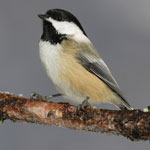
The vocal skill of birds derive from the unusual structure of their powerful vocal equipment. The syrinx is the sound-producing organ in birds. It is the equivalent of the human sound box. The syrinx contains membranes which vibrate and generate sound waves when air from the lungs is passed over them. The muscles of the syrinx control the details of song production; birds with more elaborate system of vocal muscles produce more complex songs.

Birds give the impression of singing in long bursts for minutes on end without catching their breath. But they actually do this by taking a series of shallow mini-breaths,which are synchronized with each syllable they sing.
Parrots have thick tongues like humans, a novelty among birds, which has the side effect of allowing them to form the
sounds of words in a manner similar to us. That means that they emit a preliminary sound from their syrinx and then modify it using the mouth, throat and tongue.
The best time to hear bird song is at dawn. The dawn chorus is one of the marvels of nature. Birds all over the world show the greatest amount of singing activity around dawn. One reason may be that dawn is the best time for sound to travel, because there is little wind and less other noise and disturbance.

